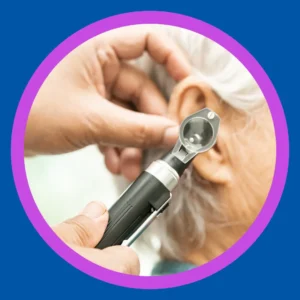Discovering How Undiagnosed Age-related Hearing Loss Affects Your Life
Undiagnosed age-related hearing loss affects millions of people across the country. Yet many individuals fail to recognize the early symptoms, delaying crucial care. Age-related hearing loss, also known as presbycusis, develops gradually and often progresses without obvious signs. It is one of the most common conditions among older adults. Left untreated, it impacts communication, safety, relationships, and cognitive health. Early detection and treatment not only improve hearing—they enhance your quality of life, independence, and emotional well-being.
What Is Age-Related Hearing Loss?
Age-related hearing loss occurs slowly as a person gets older. It typically affects both ears equally. It often starts with high-frequency sounds, making it harder to hear voices in noisy environments. You may first notice that conversations are harder to follow, especially in crowded places or when multiple people are speaking.
Changes inside the inner ear or auditory nerve often cause this type of hearing loss. Age-related hearing loss may also involve nerve pathways between the ear and the brain. These changes can reduce your ability to interpret sounds clearly, even when you can still hear them at a basic level.
Long-term exposure to noise, certain medical conditions, and genetics may also contribute. Conditions like high blood pressure, heart disease, and diabetes can damage your auditory system over time. In some cases, medications that are toxic to sensory cells in the ear may play a role.
Quick Facts About Age-Related Hearing Loss
- One in three adults ages 65–74 has hearing loss
- Nearly half of adults over age 75 have trouble hearing
- 15% of U.S. adults report some degree of hearing difficulty
- Most people experience gradual hearing decline starting in their 50s
- Many are unaware they have hearing loss until it becomes severe
These numbers emphasize why regular hearing evaluations are critical for aging adults.
Understand more about Medicare hearing aid coverage.

Why Age-Related Hearing Loss Often Goes Undiagnosed
Several reasons explain why many people live with undiagnosed age-related hearing loss.
-
Gradual Onset Makes Symptoms Easy to Miss
- Hearing decline happens slowly over time
- People adjust their habits without realizing it
- Subtle hearing difficulties often go unnoticed or ignored
-
Lack of Awareness and Misconceptions
- Some people believe hearing loss only affects others
- Stigma may prevent people from admitting difficulty
- Hearing loss is often seen as a normal, untreatable part of aging
-
Infrequent Screening and Missed Opportunities
- Routine checkups often don’t include hearing tests
- Many primary care physicians miss subtle signs
- Older adults may hesitate to bring up hearing concerns
-
Hearing Loss Often Mimics Other Conditions
- Symptoms may be confused with memory loss or cognitive decline
- Social withdrawal caused by hearing loss is mistaken for depression
A hearing care provider can identify the real cause and recommend solutions.
Find out how avoiding hearing tests could make the problem worse.
Why People Avoid Hearing Loss Treatment
Even when people suspect hearing loss, many still avoid seeking care. Common barriers to treatment include:
-
Denial or Fear of Aging
- People accept hearing decline as inevitable
- Worry about looking old keeps people from wearing hearing aids
- Social stigma and self-image concerns prevent early treatment
-
Financial Barriers and Limited Access
- Some avoid care due to cost or lack of insurance coverage
- Hearing aid prices vary, and not all are covered by plans
- Rural or underserved areas may lack hearing care providers
-
Misinformation and Unrealistic Expectations
- Some think hearing aids won’t work
- Others had poor experiences with outdated technology
- People expect perfect hearing and feel discouraged by natural limitations
-
Competing Health Priorities
- Chronic illnesses take precedence over hearing health
- Hearing loss is often overlooked amid other age-related concerns
Treating hearing loss earlier leads to better outcomes, better communication, and better emotional health.
Don’t Let Hearing Loss Disrupt Your Life
Delaying care for hearing loss leads to more than inconvenience. It limits your ability to connect with others and reduces your quality of life. It can also increase your risk of injury, depression, and cognitive decline.
The sooner you seek help, the sooner you can improve your hearing and overall wellness. Hearing care providers offer solutions tailored to your needs, lifestyle, and communication goals.

Effects of Untreated Hearing Loss
Ignoring age-related hearing loss causes real consequences:
- Difficulty participating in conversations and social activities
- Increased risk of loneliness and isolation
- Higher rates of depression and anxiety
- Reduced memory, focus, and mental alertness
- Greater chance of falls and physical accidents
- Declining emotional well-being and self-confidence
Studies show that untreated hearing loss affects how the brain processes speech. The longer hearing loss goes unaddressed, the harder it becomes to interpret sound clearly. Early intervention helps prevent further decline and preserves mental sharpness.
Discover more about how untreated hearing loss affects relationships.
Common Warning Signs of Hearing Loss
Many people are unaware they have hearing loss until it interferes with daily life. Watch for these early symptoms:
- Trouble understanding speech on the phone
- Difficulty hearing in noisy environments
- Asking others to repeat themselves often
- Turning up the volume higher than others prefer
- Struggling to understand high-pitched voices
- Thinking people are mumbling or speaking too softly
- Feeling tired or stressed after social conversations
Noticing even a few of these signs means it’s time to consider a hearing evaluation.
Self-Check: Do You Have a Hearing Problem?
Ask yourself the following:
- Do you avoid conversations in noisy places?
- Are family members frustrated by your hearing difficulties?
- Do you feel left out during social events?
- Is it harder to follow fast-paced discussions?
- Do you miss doorbells or phone calls frequently?
- Are you more isolated now than you were before?
If you said yes to more than one, consult a hearing care provider. Early action can make a lasting difference.
Hearing Loss Treatments That Can Help
Hearing loss treatments are more advanced, comfortable, and effective than ever. Available solutions include:
-
Hearing Aids
- Enhance sound clarity and speech understanding
- Discreet models fit comfortably behind or in the ear
- Some connect to smartphones and filter background noise
Learn about the six best hearing aids for noisy environments.
-
Cochlear Implants
- Ideal for severe hearing loss when hearing aids aren’t enough
- Surgically implanted to directly stimulate auditory nerves
-
Assistive Listening Devices
- TV amplifiers, smartphone apps, and hearing loops improve clarity for those with hearing aids
- Useful in places of worship, theaters, and public venues
Work with a hearing care provider to find the best solution for your needs and lifestyle.
Support Makes a Difference: Involve Your Family
Family and friends play an important role in your hearing journey. Their support can make communication easier and more enjoyable. Here’s how loved ones can help:
- Speak clearly and at a moderate pace
- Face you while talking and use facial expressions
- Reduce background noise during conversations
- Be patient and encouraging, not frustrated
- Choose quieter places when dining out or meeting socially
- Use visual aids like writing or gestures when needed
Support makes adapting to hearing aids and devices easier. Together, you can build stronger communication habits.
Explore tips for communicating with those who have hearing loss.
Hearing and Brain Health Are Closely Linked
Hearing loss doesn’t just affect your ears—it affects your mind. Studies show that untreated hearing loss contributes to cognitive decline and increases dementia risk.
When the brain doesn’t receive clear sound signals, it works harder to fill in the gaps. Over time, this leads to fatigue, confusion, and decreased memory function. Treating hearing loss may help keep your brain sharp and reduce mental decline.
Research from Johns Hopkins found that people with untreated hearing loss had higher rates of dementia. The more severe the hearing loss, the higher the cognitive risk. Early treatment can preserve brain function and improve long-term well-being.
How to Protect Your Hearing Over Time
You can’t prevent age-related hearing loss completely, but you can reduce added damage:
- Turn down music and TV volume
- Use hearing protection around loud machinery
- Avoid prolonged exposure to noise without breaks
- Don’t insert objects into your ears
- Avoid medications known to damage hearing
- Schedule hearing checkups yearly after age 60
Hearing health is lifelong. Taking small steps today protects your hearing tomorrow.

Don’t Ignore the Signs—Take Action Today
Undiagnosed age-related hearing loss should not be ignored. The sooner you act, the better your results. Hearing care helps you stay socially connected, mentally sharp, and emotionally well.
